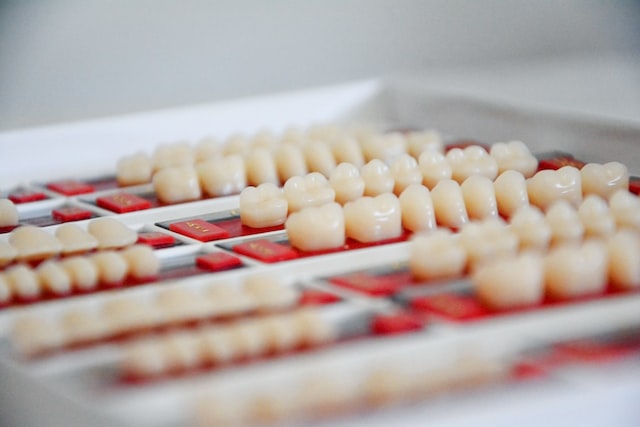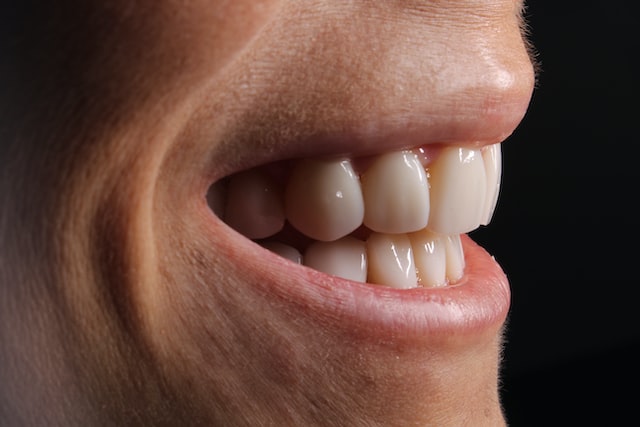Composite and porcelain veneers are dental restorations that are used to enhance the appearance of teeth. The main difference between the two is the material they are made of. Composite veneers are made of a tooth-colored resin material while porcelain veneers are made of thin ceramic shells that are custom-made to fit over the front of the teeth.
What are composite and porcelain veneers?
(Photo by Rudi Fargo on Unsplash )

Composite veneers are made from a mixture of plastics and glass. They are thinner than porcelain veneers, making them less durable. However, they are also less expensive and can be applied in a single visit to the dentist. Porcelain veneers are thin shells of ceramic that are custom-made to fit over the front surface of your teeth. Both types of veneers can improve the appearance of your smile by hiding imperfections such as chips, cracks, and discolouration.
The main difference is in their durability and longevity. Composite veneers are not as strong as porcelain veneers and typically only last for about 5 to 7 years before they need to be replaced. Porcelain veneers, on the other hand, can last for 10 to 15 years or even longer with proper care.
Another difference between composite and porcelain veneers is the cost. Composite veneers are usually less expensive than porcelain veneers because they require less time and labor to apply. However, porcelain veneers will likely provide you with a more natural-looking result that lasts longer.
Porcelain veneers can be used to correct a number of different dental problems, including:
- Discoloration or staining of the teeth
- Wear and tear on the teeth
- Misshapen or irregularly shaped teeth
- Gaps between the teeth
Porcelain veneers are extremely durable and long lasting, and they can give you a beautiful, natural looking smile.
If you’re considering getting either type of veneer, be sure to consult with a qualified cosmetic dentist who can help you choose the right option for your needs and budget.
Which is better?
The debate over which is better – composite or porcelain veneers – is one that has been going on for years. Both have their own unique set of benefits and drawbacks, so it ultimately comes down to what your specific needs and preferences are. Here’s a quick rundown of the pros and cons of each type of veneer:
Composite veneers:
Pros
- More affordable than porcelain veneers
- Can be completed in just one dental visit
- Less likely to damage natural teeth during application
Cons
- Not as durable as porcelain veneers (lasts around 5-7 years on average)
- Can stain more easily than porcelain veneers
Porcelain veneers:
Pros
- More durable than composite veneers (lasts around 10-15 years on average)
- Resists staining better than composite veneers
Cons
- More expensive than composite veneers
- Requires two dental visits (one for consultation/preparation, one for actual application)
- lightly more invasive than composite veneers (teeth may need to be shaved down slightly before application)
How much do they cost?
Composite veneers are less expensive than porcelain veneers, typically costing around $500-$1,000 per tooth. Porcelain veneers are more expensive, typically costing around $1,000-$2,500 per tooth. The cost difference is due to the materials used and the labor involved in creating each type of veneer.
How long do they last?
Composite veneers usually last between 5 and 7 years, while porcelain veneers can last up to 20 years with proper care. Both types of veneers are made from durable materials, but porcelain is typically more resistant to staining and wear.
Can you drink coffee with composite veneers?
You can drink coffee with composite veneers, but you should avoid dark-colored beverages like red wine or cola, which can stain the resin.
Can I remove my composite veneers?
If you’re considering removing your composite veneers, it’s important to consult with your dentist first. They will be able to assess whether or not your veneers can be removed without damaging your teeth. In some cases, the removal process can be complicated and may even require surgery.
Do composite veneers stay white?
(Photo by Sarahí Rivera on Unsplash )

Composite veneers are made of a resin material that can be customized to match the color of your natural teeth. Porcelain veneers are made of a thin layer of porcelain that is fused to the front surface of your tooth. Both types of veneers are custom-made and bonded to the front surface of your teeth.
Composite veneers can last for many years with proper care. However, they may yellow over time and may not be as resistant to staining as porcelain veneers. Porcelain veneers are more expensive than composite veneers and require more preparation of the tooth before they can be placed.
How long do porcelain veneers last?
On average, porcelain veneers will last between 10 and 20 years. However, how long your veneers last will depend on a number of factors, including how well you take care of them and your personal oral hygiene habits.
If you take good care of your veneers and practice good oral hygiene, your veneers can last for many years. However, if you don’t take care of them properly or if you have poor oral hygiene habits, your veneers may not last as long.
So, if you’re considering porcelain veneers, be sure to talk to your dentist about how to properly care for them and what you can do to prolong their life.
Do porcelain veneers break easily?
Porcelain veneers are made of a strong, durable material that is resistant to breaking. However, they are not indestructible and can break if they are subject to a hard impact. If you have porcelain veneers, it is important to take care of them and avoid activities that could put them at risk for breaking.
What do porcelain veneers do?
Porcelain veneers are a type of cosmetic dentistry that can improve the appearance of your teeth. They are made from thin pieces of porcelain that are custom-made to fit over your existing teeth. Porcelain veneers can be used to correct a number of dental problems, including:
- Teeth that are discolored or stained
- Teeth that are chipped or cracked
- Teeth that are misaligned or have gaps between them
Porcelain veneers can give you a beautiful, natural-looking smile. They are durable and long-lasting, and they can resist staining and discoloration.
What is the best age to get veneers?
There is no one definitive answer to this question. Ultimately, the best age to get veneers depends on your individual needs and preferences.
If you are looking for a more immediate cosmetic improvement, then porcelain veneers may be the better option for you. However, if you want a more natural-looking result that will gradually improve over time, then composite veneers may be a better choice.
Age is also a factor to consider when choosing between composite and porcelain veneers. If you are younger, you may want to consider composite veneers because they are less likely to chip or crack than porcelain veneers. However, if you are older, porcelain veneers may be a better option because they tend to last longer than composite veneers.
Featured Image By – Photo by Elena Mozhvilo on Unsplash









